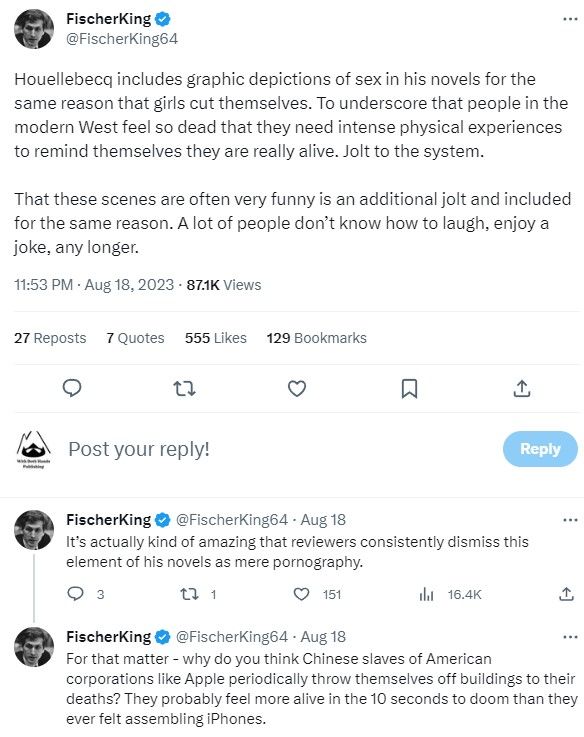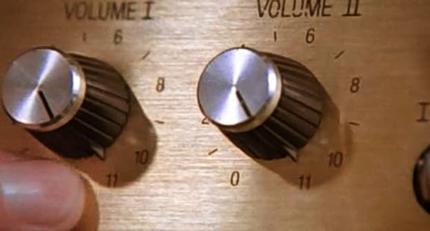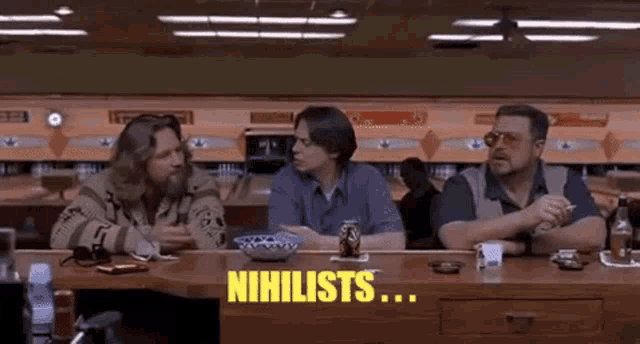Gruesome Futures Book Review

Gruesome Futures is the fourth of Jon Weichsel's Tales to Make You Vomit. Weichsel clearly believes in truth in advertising, as the title and cover are an honest description of what you will find inside. If anything, this cover is a little tamer than some of the previous installments, while the contents are, if you can possibly believe this, more disgusting, more horrible, more revolting than anything Weichsel has previously done.
This is the first of the Tales to Make You Vomit that features stories by other authors. Here, Weichsel has served as editor and written a framing narrative. Three short stories are included, "It Only Hurts When I Swallow" by Misha Burnett, "The Rape and Annihilation of Babe Babalonia" by Max Gunssler, and "The Secret on Subfloor 82" by Todd Love.
The only one of these three contributors that I am familiar with is Burnett, and his contribution here rhymes with a couple of earlier short stories from Burnett's collaboration with Louise Sorenson, Duel Visions. I say that it rhymes insofar as "It Only Hurts When I Swallow" is sexually explicit, absurdly clinical and concrete, and somehow feels very personal, like an anguished cry from a broken heart.
Burnett here uses the form of the short story to great effect, playing with ambiguity and brevity to make you question everything that happens, that might have happened, or should have happened. The horror is magnified by you not quite knowing the whole story. Like a joke, if you had to explain it, it wouldn't be quite so powerful.
And it is powerful, a brutal gut-punch challenging justice itself, or at least the thing that currently wears its skin, Fīat iūstitia ruat cælum.

"The Rape and Annihilation of Babe Babalonia" by Max Gunssler was far too gross for me. I probably read half of it, and needed to skip through the rest to get the gist. The story combines all of the most outré elements of slasher movies with cannibalism, vomit, diarrhea, and the graphic violation of every possible orifice with tentacles.
To get a handle on this, I remind myself that Weichsel's Tales to Make You Vomit is satire, rather than parody. And the essential difference between satire and parody is that you parodize what you love and satirize what you hate. "The Rape and Annihilation of Babe Babalonia" can be read as an obscene exaggeration of sexual commodification and objectification.
And yet...at the same time it is often the case that those with the most visceral hates have strange obsessions with the object of their hatred. It is hard to avoid that impression here. This story seems like it is in a state of superposition, occupying both states at the same time, making a point of how absurd our society has become, and finding it titillating that it is. Which of course makes the story fractally more absurd.
You might be able to make an argument that Westerners are so spiritually dead that such a shock is needed to wake them up and make them see. I'm not quite convinced this is true, but I see the argument.

"The Secret on Subfloor 82" is much like "The Rape and Annihilation of Babe Babalonia", but instead of its object being the sale of sexual perversion, it is the perversion of justice and honor in the use of violence by the state.

This is perhaps the kind of story I'm most familiar with, as this takes modern interpretations of fantasy adventure and turns the sadism and violence up to eleven. "The Secret on Subfloor 82" is echoing a theme you can find in far more prestigious stories.
Take Cormac McCarthy's Blood Meridian for example. Fancy literature has long since taken a dark turn that isn't much different than Todd Love's short story here. Yet, McCarthy's book is at pains to dress its self up:
What follows is an orgy of violence and depravity across the southwest. Scalping, murder, drunken rampage, rape, robbery, and unspeakable violence, that culminates in tragedy for all involved.
McCarthys Blood Meridian is interesting, his prose is masterful, near Biblical, a concoction of The King James Bible and Pagan epics such as Beowulf. His style is one of vivid ultra-violence wrapped in the language of symbolic poetry.
Alexandru Constantin's Substack spends quite a bit of time exploring the Miltonian character of Judge Holden in Blood Meridian. Todd Love just skips past the pretty language and the complicated prose because those features are an impediment to a nihilistic conclusion, to the slap in the face that this story is supposed to be.

Northrop Frye argued that there were four mythoi of stories: comedy, romance, tragedy, and irony, which were all phases of a central unifying myth. Frye linked the historical development of literature to a grander cycle of civilization, likening each of the mythoi to a season. Irony is the characteristic mythoi of modernity, and of cultural winter.
Frye described the development of irony as itself having stages, an internal logic that creates the cycle:
As a phase of irony in its own right, the fourth phase looks at tragedy from below, from the moral and realistic perspective of the state of experience. It stresses the humanity of its heroes, minimizes the sense of ritual inevitability in tragedy, supplies social and psychological explanations for catastrophe, and makes as much as possible of human misery seem, in Thoreau's phrase, "superfluous and evitable." This is the phase of most sincere, explicit realism: it is in general Tolstoy's phase, and also that of a good deal of Hardy and Conrad.
...
The fifth phase, corresponding to fatalistic or fifth-phase tragedy, is irony in which the main emphasis is on the natural cycle, the steady unbroken turning of the wheel of fate or fortune. It sees experience, in our terms, with the point of epiphany closed up, and its motto is Browning's "there may be heaven; there must be hell." Like the corresponding phase of tragedy, it is less moral and more generalized and metaphysical in its interest, less melioristic and more stoical and resigned. The treatment of Napoleon in War and Peace and in The Dynasts affords a good contrast between the fourth and fifth phases of irony.
...
The sixth phase presents human life in terms of largely unrelieved bondage. Its settings feature prisons, madhouses, lynching mobs, and places of execution, and it differs from a pure inferno mainly in the fact that in human experience suffering has an end in death. In our day the chief form of this phase is the nightmare of social tyranny, of which 1984 is perhaps the most familiar. We often find, on this boundary of the visio malefica, the use of parody—religious symbols suggesting some form of Satan or Antichrist worship. In Kafka's "In the Penal Colony" a parody of original sin appears in the officer's remark, "Guilt is never to be doubted." In 1984 the parody of religion in the final scenes is more elaborate: there is a parody of the atonement, for instance, when the hero is tortured into urging that the torments be inflicted on the heroine instead.
Tales to Make You Vomit is clearly of the sixth and final phase in Frye's model. I can see why artists looking for something impactful to say will go this way, it is part of the development of literature. And yet, I can't help but wonder if we should be cautious.
Nuclear grade satire isn't the only characteristic cultural product of Winter. It is also possible for artists to spend their time perfecting the forms produced, selecting and polishing the best our age has to offer in order to pass those forms on to the future. After all, while the English language title of Oswald Spengler's most famous work, the Decline of the West, is widely considered to be an accurate reflection of the pessimism of the contents, it is possible to render the German Der Untergang des Abendlandes in an alternative way.
Literally "Sunset in the Evening Lands", the more idiomatic way to translate this into English could be The Perfection of the West. Satire's power lies in exposing untruths, in forcing us to confront the things that are so easy to rationalize away. But satire, while a useful tool, isn't in itself the best our age has to offer. Thus, while these short stories offer a kind of social critique that is honestly hard to come by, I have to wonder if this is precisely what going too far looks like.
I received a review copy from the editor.
With Both Hands Classics | My other book reviews | Reading Log
Mini-reviews

Comments ()